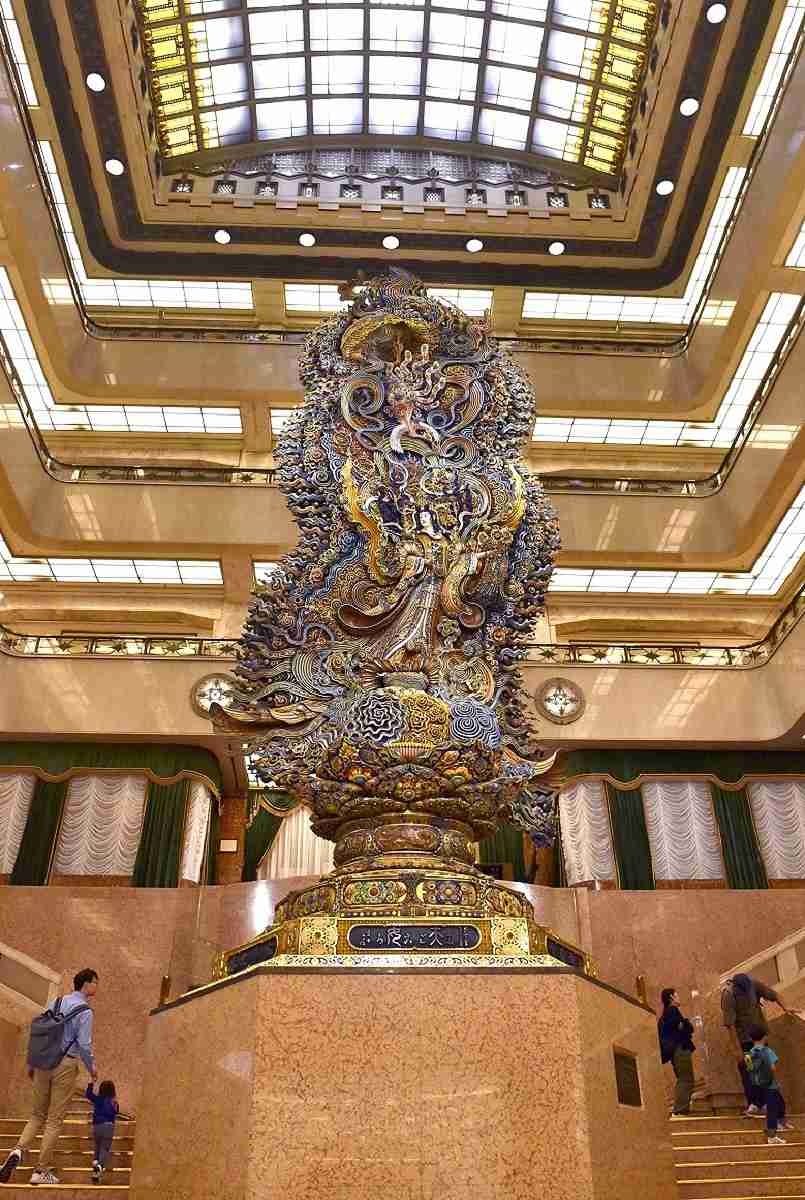
A sculpture of a heavenly maiden is seen in the central hall of the main building of the Nihombashi Mitsukoshi Main Store in Chuo Ward, Tokyo.
13:22 JST, December 25, 2023
The main building of the Nihombashi Mitsukoshi Main Store in Chuo Ward, Tokyo, is Mitsukoshi’s flagship store and believed to be the first department store in Japan. It stands close to the Nihombashi bridge, the starting point of the Tokaido and four other major travel routes in the Edo period (1603-1867).
The main building was rebuilt in 1927 after the 1923 Great Kanto Earthquake and is designated as a national important cultural property. A pair of lion statues greeting visitors at the main entrance were installed in 1914 when the store was first built and have long been familiar to visitors as a symbol of the department store.
The 2.69-meter-long statues are called “miracle lions” because they came out nearly unscathed when the building was damaged by the earthquake, and even avoided being scrapped for munitions amid the mandate to turn in metal objects during World War II. According to the department store, some people try to straddle them in the middle of the night because it is said one’s wish comes true if they ride them without being seen by anyone else.
In the central hall of the department store, in a five-story atrium, stands an 11-meter-tall sculpture of a heavenly maiden who represents the store’s philosophy of “magokoro,” or sincerity. Sculptor Gengen Sato used a 500-year-old cypress tree to create the statue, which took about 10 years to complete.
Children, tourists and other visitors can be seen spotting ammonites and other fossils embedded in the marble used for walls and other parts of the store interior.
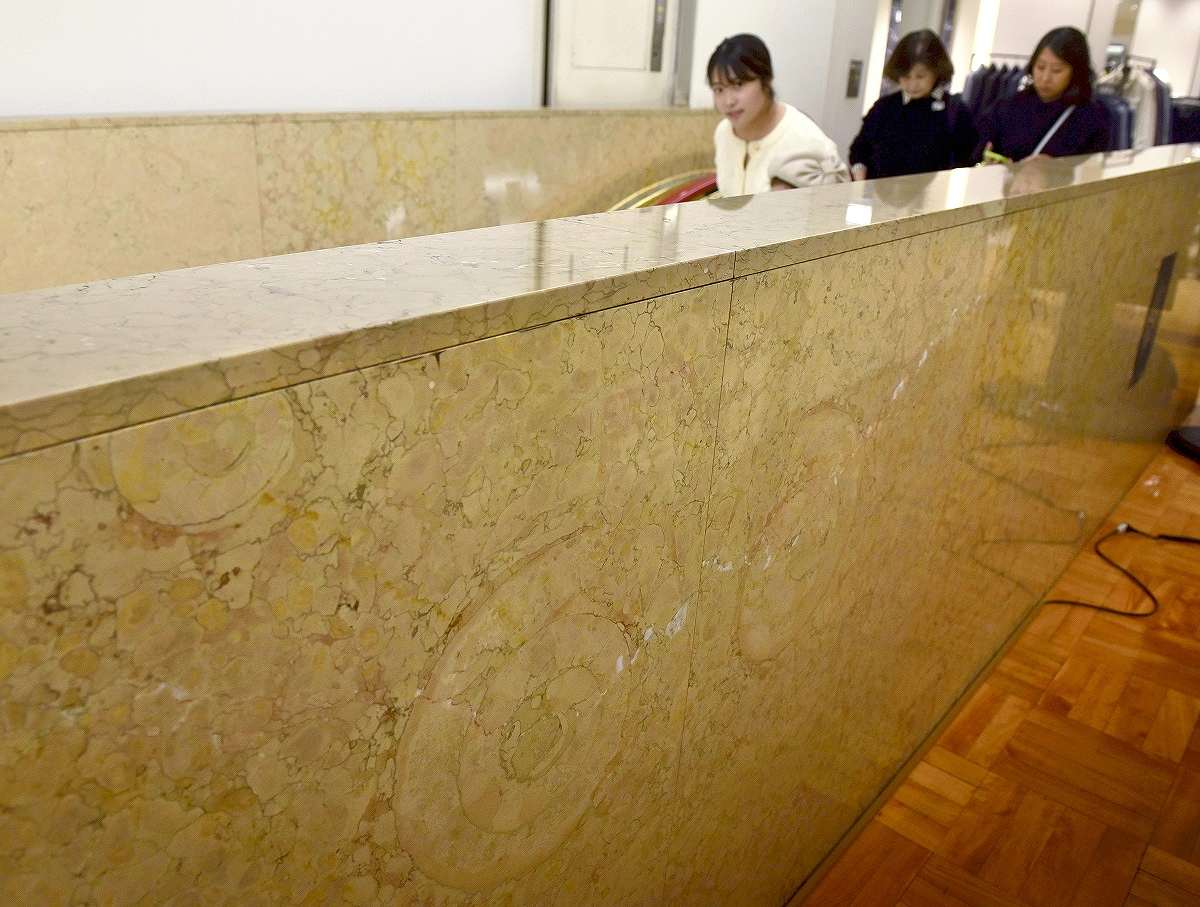
Fossils contained in marble used for the interior of the department store include one as wide as 65 centimeters.
Mitsukoshi’s predecessor was Echigoya, a kimono store founded by the Mitsui family in 1673. On the rooftop is a branch shrine of Mimeguri Shrine in Sumida Ward, Tokyo. Because the kanji for “meguri” (“囲”) of “mimeguri” is the kanji representing the “i” (“井”) of “Mitsui” enveloped, or “guarded,” by a square box, the shrine is believed to be the guardian deity of the family.
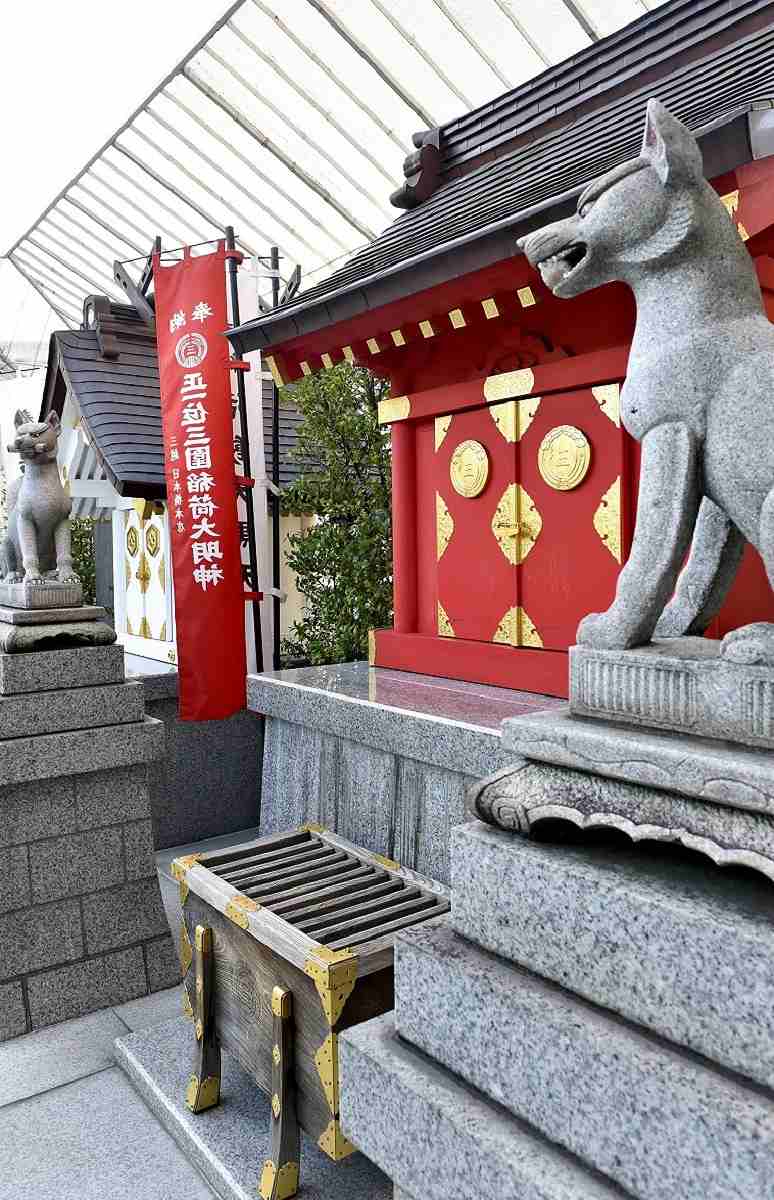
Mimeguri Shrine on the rooftop of the department store
According to store manager Ryota Marui, 51, store employees pray for the health of customers at the shrine on the first day of every month. Marui says the shrine is “a guardian of the entire Nihombashi area, where the Mitsui group is engaged in community development.”
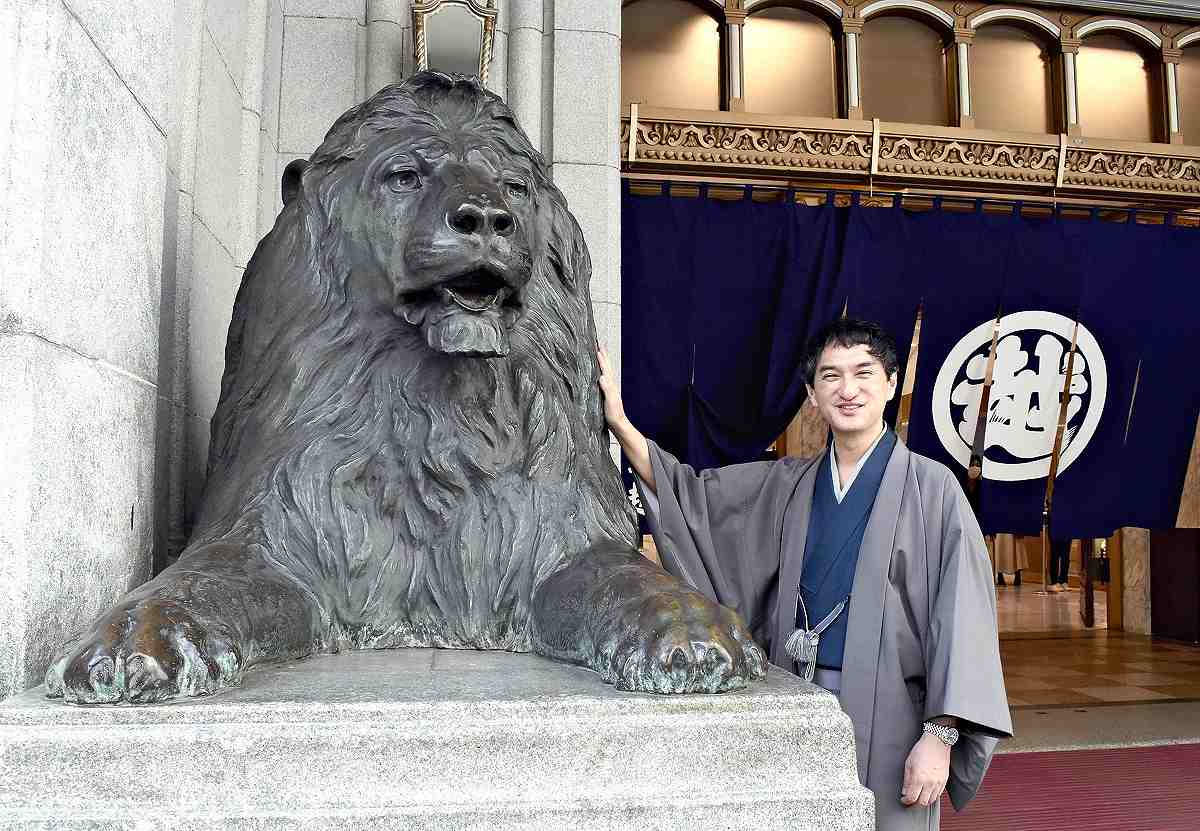
Store manager Ryota Marui stands with one of the lion statues, modeled after a statue at Trafalgar Square in London.
When it was a kimono store, Mitsukoshi became one of first retailers to introduce sales methods that are common today, such as using price tags to show the same prices to every customer and displaying products. In 1904, Mitsukoshi became the first retailer that declared to operate as a department store like those in the United States.
Amid the expansion of large-scale malls and e-commerce, the department store industry is in the midst of a changing landscape. Through my visit, I was able to witness Mitsukoshi’s unchanging spirit of sincerity and where the history of Japanese department stores started.
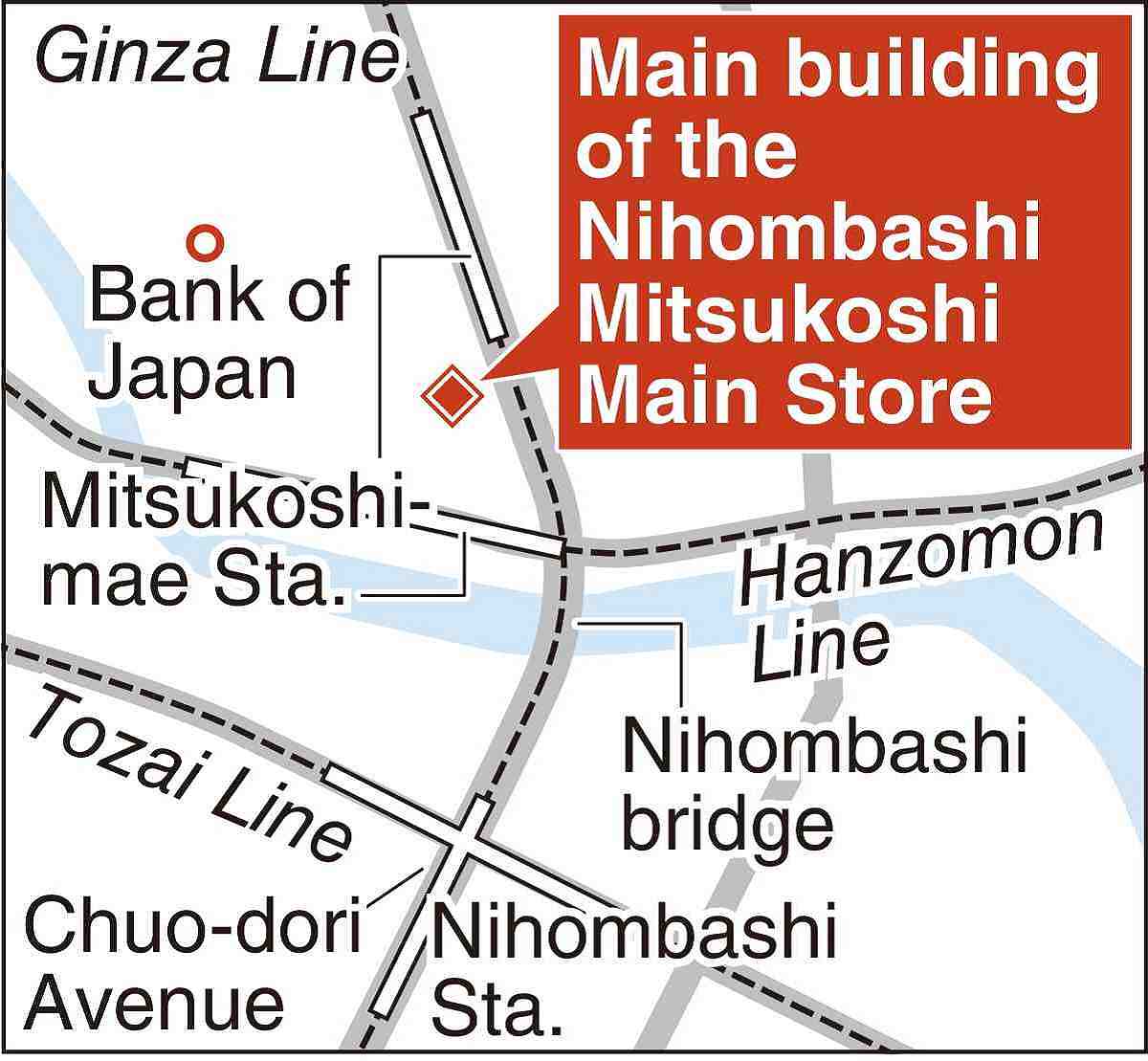
Nihombashi Mitsukoshi Main Store
Address: 1-4-1 Nihombashi-Muromachi, Chuo Ward, Tokyo
Access: A 1-minute walk from Mitsukoshimae Station or a 5-minute walk from Nihombashi Station
Memo: Open 10 a.m. to 7 p.m. (food section and restaurant hours may vary).
Related Tags
Top Articles in Features
-

Tokyo’s New Record-Breaking Fountain Named ‘Tokyo Aqua Symphony’
-

Sapporo Snow Festival Opens with 210 Snow and Ice Sculptures at 3 Venues in Hokkaido, Features Huge Dogu
-

Tourists Flock to Ice Dome Lodge at Resort in Hokkaido, Japan; Facility Invites Visitors to Sleep on Beds Made of Ice
-

High-Hydration Bread on the Rise, Seeing Increase in Specialty Shops, Recipe Searches
-

Heirs to Kyoto Talent: Craftsman Works to Keep Tradition of ‘Kinran’ Brocade Alive Through Initiatives, New Creations
JN ACCESS RANKING
-

Japan PM Takaichi’s Cabinet Resigns en Masse
-

Japan Institute to Use Domestic Commercial Optical Lattice Clock to Set Japan Standard Time
-

Israeli Ambassador to Japan Speaks about Japan’s Role in the Reconstruction of Gaza
-

Man Infected with Measles Reportedly Dined at Restaurant in Tokyo Station
-

Videos Plagiarized, Reposted with False Subtitles Claiming ‘Ryukyu Belongs to China’; Anti-China False Information Also Posted in Japan


























